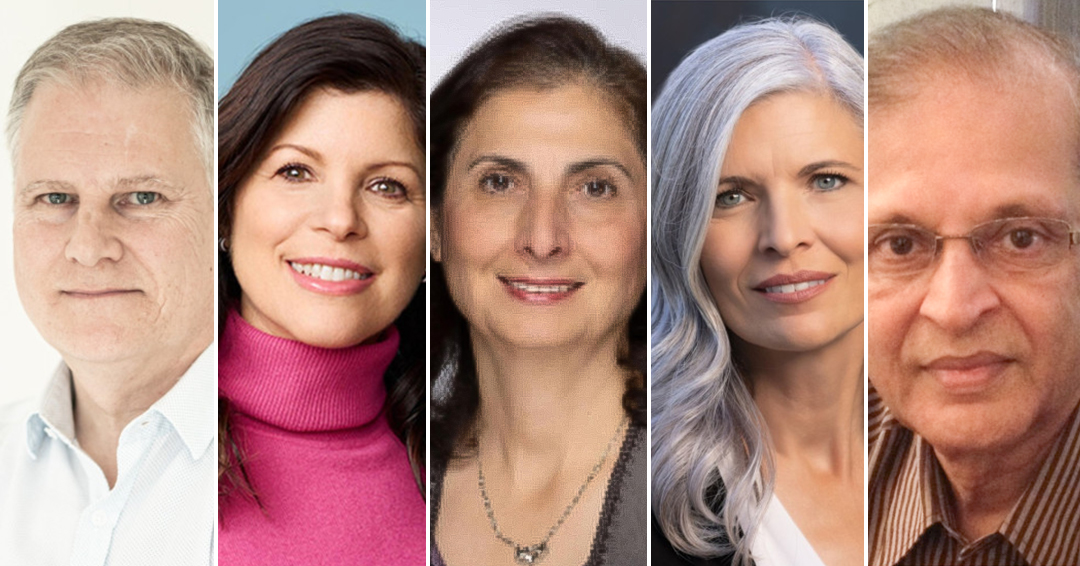
Professors from the Faculty of Engineering, the Faculty of Dental Medicine and Oral Health Sciences, and the Faculty of Medicine and Health Sciences part of the cohort of fifty-three engineers from across Canada chosen for the illustrious honour
On May 6, the Canadian Academy of Engineering announced the election of fifty-three new Fellows, with five of them hailing from McGill University. This year’s cohort includes Associate Vice President of Innovation + Partnerships, Benoit Boulet. He is a professor in the Faculty of Engineering’s Department of Electrical and Computer Engineering, a role he has held since 1998. He is also the Director of the McGill Engine, and the former director of the McGill Centre for Intelligent Machines.
Boulet is also a board member of Mila – Quebec Artificial Intelligence Institute, IVADO, Montreal InVivo, STARaCom and several other Montreal-based engineering and entrepreneurial associations, and he is a Senior Member of the Institute of Electrical and Electronics Engineers. In addition, he is also a registered professional engineer in the Province of Quebec.
Boulet’s research in engineering has long been in cutting edge technologies. Examples of his work include: biomedical controls that led to the development of an artificial pancreas, advanced transmission systems for electric vehicles, and algorithms for smart power grids, among others.
The Canadian Academy of Engineering is the national institution through which Canada’s most distinguished and experienced engineers provide strategic advice on matters of critical importance to Canada. The CAE is an independent, self-governing and non-profit organization established in 1987. Members of the CAE are nominated and elected by their peers to Fellowships, in view of their distinguished achievements and career-long service to the engineering profession.
Four other professors from the Faculty of Engineering, the Faculty of Dental Medicine and Oral Health Sciences, and the Faculty of Medicine and Health Sciences have also been inducted into the Academy. They are:
Tal Arbel, Professor, Department of Electrical & Computer Engineering, Faculty of Engineering
A tireless advocate for women in STEM, Prof. Arbel’s research lies at the intersection of machine learning, computer vision and medical image analysis. She has built an internationally renowned, multidisciplinary research program where probabilistic machine learning models are developed to address a wide range of medical imaging problems. Her work has been recognized through many awards and prizes, including her being named as a Canada CIFAR AI Chair at Mila – Quebec AI Institute.
Viviane Yargeau, Professor, Department of Chemical Engineering and Dean, Faculty of Engineering
Over her academic career spanning two decades, Viviane Yargeau, Dean of Engineering at McGill University, has demonstrated remarkable expertise, innovation, and leadership. She has been a driving force behind the protection of water resources, the training of the next generation of engineers, and equitable access to the profession, greatly impacting the engineering community. As a contributor to her profession and prolific researcher and academic leader, Yargeau exemplifies the highest standards of excellence in engineering, consistently pushing the boundaries of knowledge and practice.
Arun Mujumdar, Professor, Department of Bioresource Engineering (FAES), and Department of Mining and Materials Engineering
Professor Mujumdar is recognized internationally for his contributions to the field of industrial drying. For decades he led a global collaboration between academia and industry to create and disseminate drying technology knowledge and apply it industrially. He trained talent globally with more than 100 PhDs graduated. He has received many awards, including Doctor Honoris Causa from three universities.
Maryam Tabrizian, Professor, Department of Biomedical Engineering, Faculty of Medicine, and Faculty of Dental Medicine and Oral Health Sciences
Professor Tabrizian has pioneered many engineering concepts in the field of biomaterials and biointerfaces to promote the interactions and crosstalk between living and artificial systems. Her research has resulted in paradigm shifts in many aspects of regenerative and nanomedicine, acclaimed publications, and research translation. Her impactful contributions to the advancement of the field of biomedical sciences and engineering have been recognized by many international and national awards.
